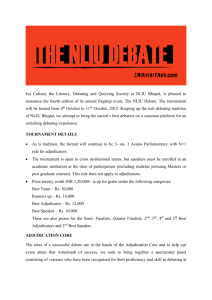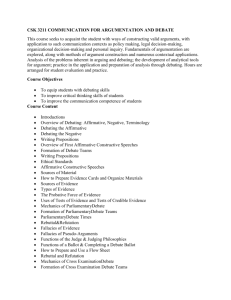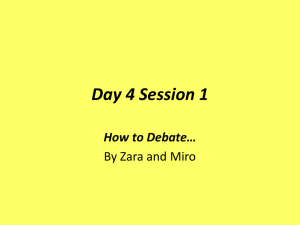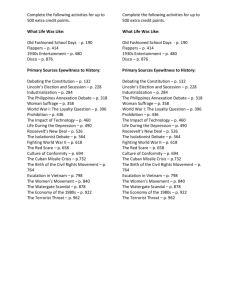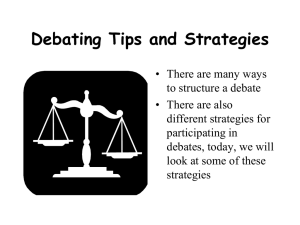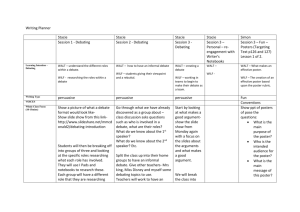Sample Debate Adjudication Sheet
advertisement
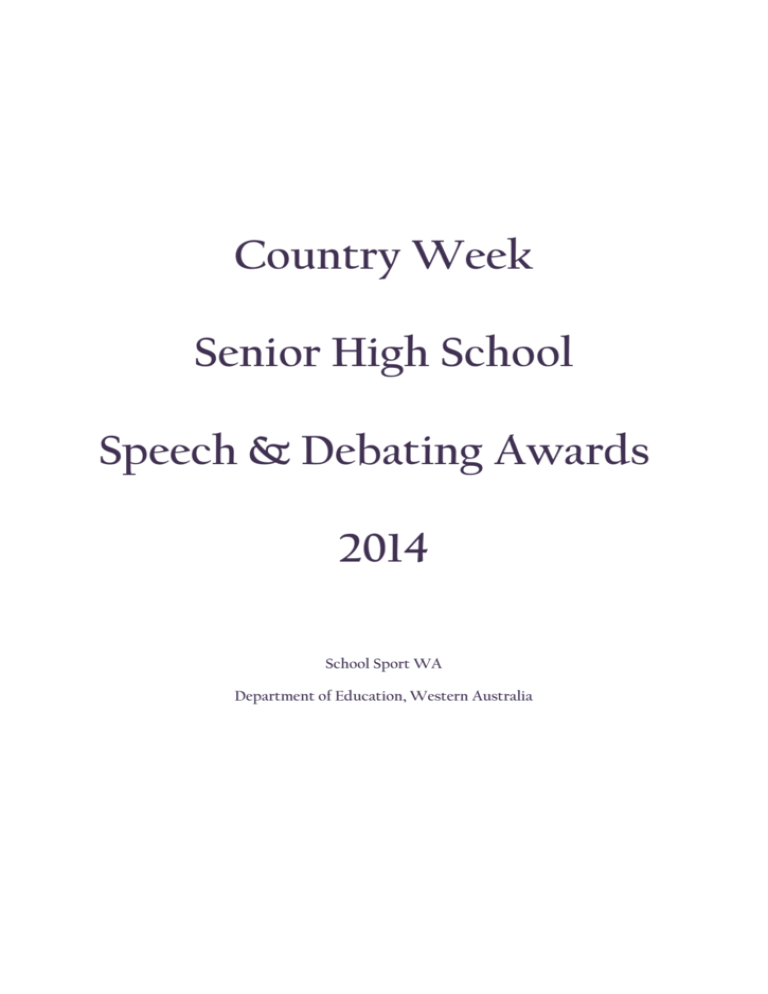
Country Week Senior High School Speech & Debating Awards 2014 School Sport WA Department of Education, Western Australia Contents Venue /Dates / Rules/ Duties / Courtesies The SPEECH Competition The DEBATING Competition Winning School Speech & Debating Champion School Points Prepared Speech Monologue A Guide to Debating Sample Prepared Speech Adjudication Sheet Sample Monologue Adjudication Sheet 03 04 07 10 10 11 14 18 19 20 Sample Debate Adjudication Sheet 21 Dates to Note 22 PLEASE NOTE THAT all forms to be completed and returned are separate documents. It is preferable that nomination form is completed electronically using CAPS ON by saving as a Word 97 - 2003 document, placing the cursor in the shaded boxes and typing, before saving again and emailing to thedenyse@gmail.com You can print the forms and complete by hand, scan and email. Country Week Speech & Debating Awards 2014 Page 2 Venue & Dates Date: Monday 30 June – Friday 4 July 2014 Venue: Challenge Stadium, Mount Claremont Further Information Denyse Passmore Email: thedenyse@gmail.com 9383 7708 (work phone) 0409 933 347 (mobile) Entries close 5.00pm Monday 12 May 2014 NOTE: Late nominations will only be accepted to make up numbers in divisions. The DRAFT Program will be uploaded to the School Sport website (www.schoolsportwa.com.au) as soon as possible after 2 June and emailed to those staff members who have provided an accurate email address. Rules 1. The decisions of all adjudicators are final and appeals are not permitted. 2. No prompting, cameras or tape recorders will be permitted as they can distract the presenter. 3. A media person from each school may record presentations by students FROM THEIR SCHOOL ONLY. To record a debate, the Teacher in Charge of the school wanting to make the recording must seek written permission from the Teacher in Charge of the opposing team before the commencement of the debate. 4. No movement will be permitted by the media person during filming. 5. At no stage during or after Country Week can any video clip be: used to comment on or to question adjudication results. Circulated on the internet / facebook or any other electronic social media. 6. No eating or drinking by the audience is allowed during presentations. Duties 1. Each school will be rostered to provide officials to help with the tasks of timekeeping, door duty and announcing. 2. Duties are to be carried out by each and every school. If, due to timetabling clashes, this is not possible, it is your responsibility to arrange a swap with another school. Courtesies 1. 2. 3. 4. The audience is to be quiet at all times during presentations. Mobile phones are to be turned OFF in all rooms. No food or drink is to be taken into the presentation rooms. Parents, teachers or students may not question the ruling or the integrity of the adjudicators. Adjudicators will be happy to answer questions that are constructive. 5. During debates: there shall be no intimidation of the opposition – either verbal or physical Country Week Speech & Debating Awards 2014 Page 3 speakers shall address the opposition as ‘the opposition’ and not as ‘you’ and shall address all comments to the audience / adjudicators The SPEECH Competition is designed for students interested in developing their oral communication skills. Students are given the opportunity to communicate their ideas to an audience in two sections: a Prepared Speech of their own composition; and a Monologue to communicate the ideas of a writer. The Speech Awards are a TEAM event and as such are considered 'one event' for the purpose of the allocation of points towards Champion School. Schools may enter ONE speech team of up to 8 students, which allows each school to enter 2 debating teams (with each debating team having 4 members) and up to 8 prepared speech and monologue entrants. The top 3 scores in Prepared Speech and Monologue for each team across all divisions will be used to calculate the team’s score, which will be averaged by 3. This will added to the team’s Debating score to calculate each teams’ points earned for Champion School points. Where a school does not have three competitors in the Prepared Speech and Monologue sections the total score for these two sections will still be averaged by three. In the Prepared Speech and the Monologue sections students compete as: individuals for the Speech Awards trophy in each division as a team to score points towards Champion School A student who competes in only the Prepared Speech OR the Monologue section of the awards cannot win the perpetual trophy. There will be three divisions: A Division for the more confident student and / or for the student who has had previous public speaking experience; B Division for less confident speakers; C Division for students who are new to public speaking. Students should nominate in the appropriate division for their expertise. Individual Scoring In each division (A, B & C) of both the Prepared Speech and the Monologue sections of the Awards all students will be scored out of 100 and then all students will be ranked, with the highest scoring student in each division ranked first. Points as per the table on page 5 will be applied. Country Week Speech & Debating Awards 2014 Page 4 The top ranked competitors in each division of both the Prepared Speech and the Monologue sections will compete in the finals, giving them the chance to improve their ranking, and thereby their points. The number of finalists (up to 10) will be decided upon by the adjudicators, taking in to account the number of competitors in each division. It is likely that there will be a different number of finalists in each division. Finalists will re-present their Prepared Speech and/or their Monologue piece giving them the chance to improve their ranking, and hence their final score. For example, 5 students are in the Prepared Speech final: Place after first round Place after Finals Student 1 5 Student 2 1 Student 3 3 Student 4 2 Student 5 4 5 2 1 3 4 The perpetual trophy for Speech for each division will be won by the student who has demonstrated consistency in both the Prepared Speech and the Monologue sections. Therefore, students will need to rank highly in both the Prepared Speech and the Monologue sections in order to qualify for the perpetual trophy. Medallions for first, second and third place getters will be awarded in each division of the Prepared Speech and Monologue. Team Score for Speech Competition After the Prepared Speech and Monologue finals, the top three scores (points applied to rankings) for each team in both Prepared Speech and the Monologue will be totaled and averaged (by 3) and points as per the table on page below will be applied and then totaled to give the team’s final combined score for the Prepared Speech and the Monologue sections. As this is a team competition, all teams will be averaged by three, regardless of whether or not they have three competitors. Team 1 All three competitors are in A division. Two are ranked first and second and the third is ranked 10th. The points are: 80+ 78 + 62 = 220 / 3 = 73.33 Team 2 Two competitors are ranked first and second in A division and the third competitor wins B division. The points are: 80 + 78 + 60 = 218 / 3 = 72.66 Team 3 Two competitors are ranked first and second in A division and the third competitor wins C division. The points are: 80 + 78 + 40 = 198 / 3 = 66 Country Week Speech & Debating Awards 2014 Page 5 Team 4 Has only two competitors who are ranked first and second in A division. The points are: 80 + 78 + 0 = 158 / 3 = 52.66 1st 2nd 3rd 4th 5th 6th 7th 8th 9th 10th A DIV 80 78 76 74 72 70 68 66 64 62 B DIV 60 58 56 54 52 50 48 46 44 42 C DIV 40 38 36 34 32 33 28 26 24 22 Country Week Speech & Debating Awards 2014 Page 6 The DEBATING Competition is to give students more opportunity to compete in debating and to improve their debating skills. Schools may enter a maximum of 2 teams in the Debating Section of the Awards. The ‘Debate 1’ team will be the team competing for Champion School points. Schools may only nominate two teams in the same division if there are not 8 teams from different schools in the division. NOTE: if there are less than 24 teams nominated for the competition, schools MAY be permitted to enter a third team to make up the numbers in divisions. Schools which express interest, on the Entry Form, in nominating a third team will be entered in to a ballot to fill the vacancies. Students in the third debating teams WILL NOT be able to take part in the Speech Competition. Each team may have 4 members who may be rotated . The fourth member of each team will take on the role of Timekeeper for each debate in which they are arguing the affirmative case and as Chairperson in each debate for which they are arguing the negative case. Where a school does not have a fourth team member, the staff member will take on the roles. The names of the students to debate each debate MUST be clearly written down and handed to the adjudicator 5 minutes prior to the start of each debate so that they can be entered on the adjudication sheet. If a team loses two team members, for any reason, once the competition has begun, and if one of them cannot be replaced, the team will be permitted to continue to debate with the first and third speaker being the same person. The team may win their debates, but will be placed last at the end of the competition, regardless of how many debates they have won. The Debating competition will be run using the Rules and Guidelines of the West Australian Debating League Inc., which form part of this nomination booklet. It is highly recommended that you familiarize yourselves with these rules. Format Each division will participate in Round Robins and places will be decided by wins over losses. Where schools have won and lost the same number of debates, points scored ‘for’ and ‘against’ by each team in each debate will be used to calculate positions at the end of the round robins. This is accepted practice by the WA Debating League. If more nominations than can be accommodated in a division are received, teams will be placed in divisions by the coordinators according to the 2013 Country Week Debating Cup results, for both relegation and elevation. The organisers reserve the right to cancel any of the divisions. Three divisions of A, B and C are offered, with up to 8 teams per division, as decided by the organizers and will depend upon the number of nominations received. Country Week Speech & Debating Awards 2014 Page 7 Please note: A Division is for experienced debaters B Division for debaters with limited experience C Division for novice debaters. Medallions for first, second and third place getters will be awarded in each division of the Debating Speaking Times Division A Division B & C Divisions A Division B & C Divisions PREPARED DEBATES Speaker Warning Bell Speakers 1 and 2 3 minutes Final Bell 4 minutes Final speaker 4 minutes 5 minutes Speakers 1 and 2 2 minutes 3 minutes Final speaker 3 minutes 4 minutes IMPROMPTU DEBATES Speakers 1 and 2 2 minutes 3 minutes Final speaker 3 minutes 4 minutes Speakers 1 and 2 1 minute 2 minutes Final speaker 2 minutes 3 minutes Final Bell If a speaker continues to speak after the final bell, the adjudicators will cease to write comments or even to listen to the argument being presented and points will be deducted for going over time. Please note that it is each school's responsibility to ensure they prepare to debate the correct topic. The organisers take no responsibility for topic information. Prepared & Impromptu Debate Topics Where there are 8 teams in a division: Topics prepared in advance will be debated for Rounds 1 and 2. Country Week Speech & Debating Awards 2014 Page 8 Impromptu topics will be debated for Rounds 3 - 5. Where there are 6 teams in a division: Topics prepared in advance will be debated for Round 1. Impromptu topics will be debated for Rounds 2 and 3. Topics for the impromptu debates will be given to schools 45 minutes before the start of the debate. For each impromptu debate, both schools must be present for the topics to be given out i.e. one school cannot begin to prepare before the other. Preparation will take place in the Hall of Champions. All team members will be permitted to take part in the preparation. Teachers are not permitted to take part in the preparation. On the advice of the WADL use of the internet is not permitted during the preparation time. Any team found with an electronic device will automatically be disqualified i.e. no mobile phones permitted. Teams may use a hard copy dictionary and a hard copy thesaurus only. Topics to be debated will be included in the Program Booklet posted on the website as soon as possible after 2 June for all round robin debates. Impromptu debate topics will be given to teams 45 minutes before each impromptu debate. Note: Palm cards may be used During the impromptu debates, schools must be seated in the room allocated to their debate 5 minutes before the start of the debate. For every half minute a school team is late there may be a penalty of half a point. Preparing the Wrong Topic If a team prepares the wrong debate topic or wrong side of the argument, they will be given 20 minutes ONLY to prepare the correct argument / topic. Country Week Speech & Debating Awards 2014 Page 9 Winning School: Speech & Debating Each school’s Team Score for The Speech Competition will be added to the The Debating Competition points earned by their first debating and the highest scoring school will be placed first for the Speech and Debating competition to win the perpetual trophy. Champion School The top 10 Speech Awards schools earn points for their school towards the Country Week Champion School. Schools not competing in all three sections of the Awards may still earn points towards Champion School if they are ranked in the top 10 schools. Using the Winning School: Speech & Debating rankings points as per the table below will be allocated towards Champion School points. 1st 2nd 3rd 4th 5th 6th 7th 8th 9th 10th 60 58 56 54 53 52 51 50 49 48 Country Week Speech & Debating Awards 2014 Page 10 PREPARED SPEECH Each competitor will deliver a MEMORISED talk (not a reading) on a subject they have chosen. The speech must be an original composition by the student. It may contain ideas from various sources, but must be verbalized in the student’s own words. Length of Speech: A Division - no more than 5 minutes in duration B Division - no more than 4 minutes in duration. C Division - no more than 3.5 minutes in duration. 1 point per minute will be deducted if a speaker goes overtime by more than 1 minute to a maximum of 2 minutes. Entrants who go over by more than 3 minutes will be disqualified. Each student will need to complete and return the Declaration prior to the commencement of the first session of Country Week. Students will be introduced by an announcer and are therefore NOT required to introduce themselves before they begin their speech. Please note: students MUST learn their speech – in previous years there has been too much reliance on palm cards and those used were too large each speech MUST be entertaining and engage the audience factual speeches need to have ‘relief’ within them students should be very careful with choice of topic – they should make sure it engrosses them students should be confident movement and gesture should be minimal and there should not be any costuming. Adjudicators highly recommend that students wear school uniform. Adjudication Marks will be awarded for each sub heading, based on the dot points under each heading. Content: Suitability: topics, which are unacceptable to many in the community generally, should be avoided as there is no virtue in alienating any part of the audience – students should seek guidance on this the presentation is for an audience of peers, so the topic should be neither so simple that it seems trivial, nor so obscure that it leaves them floundering Originality: Country Week Speech & Debating Awards 2014 Page 11 the topic can be used to inform, persuade or share a viewpoint a topic that is likely to provide new insights for the audience will be more appealing than one with which adolescents are already familiar, provided it is not too obscure there should at least be an original point of view presented if the topic is a familiar one. Structure: the ideas being expressed need to be organised in a logical way there needs to be a clear introduction and conclusion the audience needs to be able to follow the speaker's thinking in order to be able to appreciate the message Clarity of ideas: points need to be clearly stated points are best supported by the appropriate and interesting use of examples avoid long-winded explanations Involvement with the topic: the student needs to be genuinely interested in, and fully familiar with, the chosen topic it is important to be able to deal confidently with the language chosen Presentation: Use of voice: the audience needs to be able to hear what the speaker has to say the speaker needs to make sure they can be heard clearly in a space at least the size of a large classroom it is also important to vary pace, pitch and tone, so the speaking is not monotonous variations in pitch and tone should flow naturally from the speaker's involvement with the topic the speed of delivery and the use of pause are elements that need special attention since, if they are used well, they will be highly significant in communicating the speaker's message Choice of language: the language used should be appropriate to the topic, the audience and the situation this is a formal speech situation and it is necessary to use Standard English the use of colloquialisms may be appropriate to the topic but should only be used to illustrate or enliven the talk, rather than dominating the presentation jargon particular to the topic should be well contextualised or simply explained Deportment: the presence of a speaker in front of a live audience depends as much on the body as on the voice a neat appearance is most important because it shows respect for the audience the ways in which the speaker stands, moves, gestures and makes eye contact are all important for the communication of the message calm and relaxed, but not sloppy, stance suggests confidence and authority fidgeting and pacing are unnecessarily distracting natural use of gesture can enliven the presentation and underline a point very effectively Country Week Speech & Debating Awards 2014 Page 12 eye contact with the audience involves the audience in the topic and shows that the speaker is communicating with them Engagement with the audience: the purpose of any public presentation is to communicate and the presentation will be successful to the extent that the audience becomes involved with the message all aspects of content and presentation will help towards this but it is particularly important to have a sense of the audience and to speak directly to them a confident manner, which comes from sound preparation as well as enthusiasm for the topic, will help to ensure that the audience enjoys the presentation the level of energy is most important, and time to relax before the presentation can make a big difference Palm cards can be useful for helping the speaker to keep to the point but they should not be over-used and should be ‘palm’ size. Props can be helpful to illustrate a topic but the speaker should be proficient in its use and it should be incidental to the speech. Country Week Speech & Debating Awards 2014 Page 13 MONOLOGUE Each student will deliver a MEMORISED piece of scripted drama, prose or poetry. This will be presented as a dramatic monologue. The piece should: stand alone be entertaining, and appropriate to the age group and experience of the student and audience. A Division – no shorter than 2.5 and no longer than 3.5 minutes B and C Divisions – no shorter than 2 and no longer than 3 minutes Palm cards are NOT permitted Students should choose Scripted Drama, Prose and Poetry pieces which enable them to build their performance, drawing on understanding of character. Stand-alone monologues (for example, monologues written as one-off acting exercises) can limit candidates. Monologue selections should be from a published poem / text / script (in the case of a play, by a recognised playwright whose works have been produced by one or more professional theatre companies). Film scripts can be counted as a published play script but the sense of theatrical convention expected in a scripted monologue should be apparent in the excerpt chosen. Monologues can be edited from the original published version. In this case the copies provided to the adjudicators should consist of a copy of the original context of the monologue, together with the edited monologue that will be performed by the candidate. Publication details of the monologue to be presented must be included on the cover page. Students are advised to avoid self-published, amateur and / or unknown playwrights / poets / writers. Students will be introduced and are therefore NOT required to introduce themselves before they begin their monologue, but must BRIEFLY set the scene for their monologue. This will not be included as part of the three minute time limit. A table and a chair will be provided for use as a prop, if required. Each competitor must: bring 2 stapled copies of their monologue script (if edited, both the edited and original versions) to Country Week. Have the completed cover sheet as the first sheet personally hand a copy of their script (edited and unedited) to each adjudicator 10 minutes before the start of the session in which they will deliver their monologue. Failure to hand the scripts to the adjudicators will result in an automatic deduction of 1 point. Country Week Speech & Debating Awards 2014 Page 14 Adjudication Student performance will be adjudicated on the following: CONTENT: Appropriateness of the passage: language and content should be suitable for a general audience the character and content should be suitable for the performer cross-gender roles are not recommended as this brings an added dimension to the presentation that may be beyond the control of the performer Suitability of the introduction: the introduction must be very brief the purpose of the introduction is to enable the audience to understand the performance so it should focus on the context of the passage rather than trying to explain it the source of the passage should be included as part of the introduction Arrangement of material: the passage should be able to stand alone, since it cannot be assumed that the audience will have any knowledge of the text from which it has been taken the passage should be true to the original, a copy of which should be provided for the adjudicators it may include minimum editing in order to maintain a logical flow, but such editing should be included as annotations on the copy provided for the adjudicators there should be a clear beginning and ending Understanding of content: there can be different interpretations of most worthwhile texts, any one of which may be a good basis for the performance, but it is important to select one for presentation and explore it thoroughly the performance should have a clear and consistent interpretation of the character/theme of the passage students should explore this aspect of the text before they make a final selection of the piece to be presented PRESENTATION: Use of voice: the audience needs to be able to hear what the speaker has to say the speaker needs to make sure they can be heard clearly in a space at least the size of a large classroom it important to vary pace, pitch and tone so that the sense and emotion of the piece are clearly communicated Control of the language: the whole piece must be memorised – serious "drying up" will be penalised the speed of delivery needs to be well rehearsed, as a significant amount of the meaning can be lost if the performer delivers the lines too quickly – something which can easily happen just through nervousness Country Week Speech & Debating Awards 2014 Page 15 phrasing is also important for communicating the meaning – it is a good idea to mark the copy of the script while it is being learnt, so that inflection and pause are incorporated in the right places correct pronunciation and syllable stress are essential if the writer's words are to be properly understood when presenting a narrative passage of prose or poetry it is important to distinguish vocally between narrative passages and passages of dialogue Use of body / movement and non verbal communication: Poetry and Prose movement and gesture should be limited and not distract from the vocal presentation costuming is not appropriate Use of body / movement and non verbal communication:: Drama this is a performance rather than a speech (compare with notes for Prepared Speech), so it is important to act out the piece using the body as well as the voice gesture and movement can be used to underline the theme of the passage, create a vivid character, increase the emotional impact and involve the audience more fully movements should be appropriate to the script and should be planned and rehearsed, preferably in front of someone else who can say what works unnecessary or unrelated movements and gestures can distract the audience Performance style / Impact / Engagement with the audience: a consistent style of presentation is important it is possible to have comic interludes in a serious piece or serious moments in a comic piece, but these elements should be well under the control of the performer – it can be disappointing for performer and audience alike if these moments are misinterpreted the intensity of the performance needs to match the intensity of the piece – a tense, exciting piece will receive a different treatment from a gentle amusing piece, for example the purpose of any performance is to communicate with an audience and the presentation will be successful to the extent that this is done, therefore Characterization for audience impact and engagement is of the utmost importance all aspects of content and presentation will help towards this, but it is particularly important to show the audience that you want to involve them – be theatrical, rather than personal in presentation confidence, which comes from thorough preparation, and a whole-hearted interpretation of the piece, are both important for engaging the audience the level of energy is most important, and time to relax before the presentation can make a big difference Notes: 1. Marks will be awarded for each sub heading, based on the dot points under each one. 2. The time limit must be strictly adhered to. The adjudicators may stop the presentation if it goes overtime. Palm cards are NOT permitted Country Week Speech & Debating Awards 2014 Page 16 Costuming and props should be kept to a minimum. 1. Where a costume is used, it should be appropriate to the character and content of the piece 2. A simple prop, which can be carried by the performer, can sometimes help the performance. 3. If a student chooses not to wear a costume, stage blacks should be worn. 4. There should be no use of effects or staging, except that there will be a chair and a table available which can, if used appropriately, be used to enhance movement. Country Week Speech & Debating Awards 2014 Page 17 A Guide to Debating Courtesy of WA Debating League This is currently being updated by WADL and will be sent to schools when they enter the competition, or before (once available) if requested by email to thedenyse@gmail.com Country Week Speech & Debating Awards 2014 Page 18 Sample Adjudication Sheet Prepared Speech The Notes for this section provide further information and should act as a guide for adjudicators. NB: The time limit must be strictly adhered to. The adjudicators may stop the presentation if it goes over time. Name: School: Title of Prepared Speech: Section Content: Pointers Mark suitability /10 originality /10 structure /10 clarity of ideas /10 involvement with topic /10 Comments /50 Presentation: use of voice /10 choice of language /10 deportment /10 engagement with /10 audience timing /10 /50 Signature of Adjudicator Total Marks Country Week Speech & Debating Awards 2014 / 100 Page 19 Sample Adjudication Sheet Monologue The Notes for this section provide further information and should act as a guide for adjudicators. NB: The time limit must be strictly adhered to. The adjudicators may stop the presentation if it goes over time. Name School Genre Title of Selection Section Content Pointers • appropriateness of passage • suitability of introduction • arrangement of material • understanding of content Mark Comments /5 /5 /10 /10 /30 Presentation • use of voice /10 • control of the language /10 • use of body / movement and non verbal communication /20 • performance style / characterisation for audience impact and engagement with audience /30 Total /70 Signature of Adjudicator Total Marks Country Week Speech & Debating Awards 2014 / 10 Page 20 Sample Debate Adjudication Sheet Topic: Matter Includes: opening, definition / elaboration / analysis, summary, arguments, close Manner Includes: vocal variety, gesture, stance, eyes, expressions, and persuasiveness Method Includes: introduction, interpretation / re-establish case, outline / attack / defense, own case, overall construction Affirmative School: Name of Speaker Time Matter (40) Manner (40) Method (20) Total (100) Time Matter (40) Manner (40) Method (20) Total (100) 1 2 3 Total Negative School: Name of Speaker 1 2 3 Total Debate Won by: Signature of Adjudicator: Country Week Speech & Debating Awards 2014 Page 21 DATES TO NOTE MONDAY 12 MAY NOMINATIONS CLOSE WEEK OF 2 JUNE DRAFT PROGRAM ON WEBSITE AT WWW.SCHOOLSPORTWA.COM.AU AND ADVISE DENYSE (THEDENYSE@GMAIL.COM) IMMEDIATELY OF OMISSIONS AND / OR CLASHES FRIDAY 20 JUNE CHECK FINAL PROGRAM ON WEBSITE AT WWW.SCHOOLSPORTWA.COM.AU. BEFORE LEAVING SCHOOL MAKE SURE THAT ALL STUDENTS COMPETING IN THE MONOLOGUE HAVE 2 STAPLED COPIES OF THEIR SCRIPT (EACH COPY TO INCLUDE A COVER SHEET) MAKE SURE THAT ALL STUDENTS COMPETING IN THE PREPARED SPEECH SECTION HAVE THEIR DECLARATION TO HAND TO THE ADJUDICATORS BEFORE THE START OF THEIR SESSION. 30 JUNE STAFF MEETING IN BLOOMFIELD LECTURE THEATRE AT CHALLENGE STADIUM – THIS IS PARTICULARLY USEFUL FOR THOSE NEW TO THE SPEECH AWARDS (IT WILL HELP YOU TO UNDERSTAND HOW THE WEEK WORKS) AND FOR THOSE RETURNING TO THE SPEECH AWARDS. ANY LAST MINUTE PROGRAM CHANGES WILL BE ADVISED AT THIS MEETING. During the Week ALL STUDENTS AND STAFF MUST CONTINUE TO CHECK THE NOTICE BOARD FOR LAST MINUTE PROGRAM CHANGES THROUGHOUT THE WEEK. THE PROGRAM ON THE DISPLAY BOARD WILL BE THE ONLY CONFIRMED PROGRAM. Country Week Speech & Debating Awards 2014 Page 22

